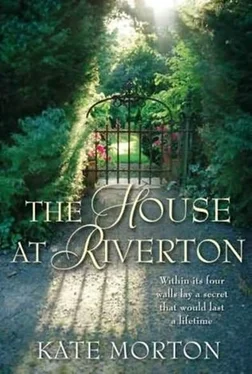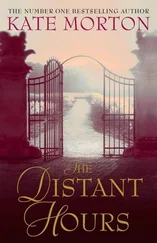‘If I may speak on behalf of the staff,’ said Mr Hamilton, ashen-faced, ‘we’re only too happy to assist in any way we can at this terrible time.’
‘Thank you, Mr Hamilton,’ said Teddy, nodding gravely. ‘As you all know, Mrs Luxton has suffered awfully over the other business at the lake. I believe it would be kindest if we kept this most recent tragedy from her for the time being. It doesn’t do to upset her further. Not while she’s with child. I’m sure you’ll all agree.’
The staff stayed silent as Teddy continued.
‘I’d ask then that you refrain from mentioning Miss Emmeline or the accident. That you make special effort to ensure newspapers are not left lying about where she might see them.’
He paused, glanced at each of us in turn.
‘Do you understand?’
Mr Hamilton blinked to attention then. ‘Ah, yes. Yes, sir.’
‘Good,’ said Teddy. He nodded a few times quickly, realised there was nothing left to say, and left with a grim smile.
After Teddy had disappeared, Mrs Townsend turned, round-eyed, to Mr Hamilton. ‘But… does he mean not to tell Miss Hannah at all?’
‘It would seem that way, Mrs Townsend,’ said Mr Hamilton. ‘For the time being.’
‘But her own sister’s death-’
‘Those were his instructions, Mrs Townsend.’ Mr Hamilton exhaled and pinched the bridge of his nose. ‘Mr Luxton is Master of this house just as surely as Mr Frederick was before him.’
Mrs Townsend opened her mouth to debate the point but Mr Hamilton cut her off. ‘You know as well as I that the Master’s instructions must be observed.’ He removed his glasses and polished them fiercely. ‘Never matter what we think of them. Or him.’
Later, when Mr Hamilton was upstairs serving supper, Mrs Townsend and Myra approached me in the servants’ hall dining room. I was at the table mending Hannah’s silver dress. Mrs Townsend sat one side, Myra the other. Like two guardsmen arrived to accompany me to the gallows.
With a glance to the stairs, Myra said, ‘You have to tell her.’
Mrs Townsend shook her head. ‘It isn’t right. Her own sister. She should know.’
I wove my needle into the silver thread reel and set my stitching down.
‘You’re her maid,’ said Myra. ‘She’s fond of you. You have to tell her.’
‘I know,’ I said quietly. ‘I will.’
Next morning I found her, as I expected to, in the library. In an armchair on the far side, looking through the huge glass doors toward the churchyard. She was intent on something in the distance and didn’t hear me approach. I came up close and stood quietly beside the matching chair. Early sunlight floated through the glass and bathed her profile, giving her an almost ethereal look.
‘Ma’am?’ I said softly.
Without shifting her gaze, she said, ‘You’ve come to tell me about Emmeline.’
I paused, surprised, wondered how she knew. ‘Yes, ma’am.’
‘I knew you would. Even though he’s told you not to. I know you well after all this time, Grace.’ Her tone was difficult to read.
‘I’m sorry, ma’am. About Miss Emmeline.’
She nodded slightly, but she didn’t take her eyes from that distant point in the churchyard. I waited for a while, and when it seemed clear she didn’t want company, I asked if there was anything I could bring her. Tea perhaps? A book? She didn’t answer at first, appeared not to have heard. And then, seemingly out of the blue, she said, ‘You can’t read shorthand.’
It was a statement, not a question, so I did not answer.
I found out later what she meant, why she spoke to me then of shorthand. But not for many years. On that morning I was still innocent of the part my deception had played.
She shifted slightly, retracted her long bare legs closer to the chair. Still didn’t meet my eyes. ‘You may go, Grace,’ she said, her voice tinged with a coldness that made my eyes sting.
There was nothing more I could say. I nodded and left, unaware it was the last conversation I would have with her.
•
Beryl brings us to the room that was Hannah’s at the end. I wonder at first whether I’ll be able to continue. But it is different now. It has been repainted and refurnished with a Victorian suite that was not amongst the original furniture at Riverton. It is not the same bed on which Hannah’s baby was born.
Most people thought it was the baby that killed her. Just like Emmeline’s birth had killed their own mother. So sudden, they said, shaking their heads. So sad. But I knew better. It was a convenient excuse. An opportunity. True enough, it wasn’t an easy birth, but she had no will left. What happened on the lake, Robbie’s death and Emmeline’s so soon after, killed her long before the baby got itself stuck in her pelvis.
I had started in the room with her, but as the contractions came harder and faster and the baby began to force its way out, she had surrendered more and more to delusion. Had stared at me, fear and anger in her face, shouted at me to leave, that it was all my fault. It was not uncommon for birthing women to lose their grasp, the doctor explained as he bid me do as she ask, to give themselves over to fantasy.
But I couldn’t leave her, not like that. I retired from her bedside but not from the room. As she lay on the bed and the doctor started to cut, I watched from the door and I saw her face. As she laid back her head, she breathed a sigh that looked an awful lot like relief. Release. She knew that if she didn’t fight it, she could go. It would all be over.
No, it wasn’t a sudden death; she’d been dying for months.
Afterwards, I was broken. Bereft. In an odd way, I had lost myself. That is what happens when you give your life and service to another person. You’re bound to them. Without Hannah, I was without function.
I had no capacity for feeling. Was emptied, just as surely as if someone had slit me open like a dying fish and scooped out everything inside. I performed perfunctory duties, though with Hannah gone there were few enough of those. I stayed a month like that, steering myself from one interchangeable location to another. Until one day I told Teddy I was leaving.
He wanted me to stay; when I refused he begged me to reconsider, for Hannah’s sake if not for his, for her memory. She had been fond of me, didn’t I know? Would want me to be a part of her daughter’s life, of Florence’s life.
But I couldn’t. I had no heart for it. I had no heart. I was blind to Mr Hamilton’s disapproval, Mrs Townsend’s tears. Had little concept of my own future, other than to know for certain it didn’t lie at Riverton.
How indescribably frightening it would have been, leaving Riverton, leaving service, if I’d had any sensation left. Better for me that I hadn’t: fear might have triumphed over grief and tied me forever to the house on the hill. For I knew nothing of life outside service. Was panicked by independence. Wary of going places, doing the simplest things, making my own decisions.
I found a little flat in the Marble Arch, though, and proceeded to live. I took what jobs I could-cleaning, waiting tables, stitching-resisted closeness, left when people started to ask too many questions, wanted more of me than I was able to give. In such occupation, I passed a decade. Waiting, though I didn’t know it, for the next war. And for Marcus, whose birth would do what my own daughter’s could not. Return to me what had been emptied by Hannah’s death.
In the meantime, I thought little of Riverton. Of all I had lost.
Let me rephrase: I refused to think of Riverton. If I found my mind, in a quiet moment of inactivity, roaming the nursery, lingering by the stairs in Lady Ashbury’s rose garden, balancing on the rim of the Icarus fountain, I quickly sought occupation.
Читать дальше












